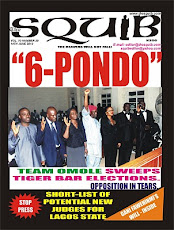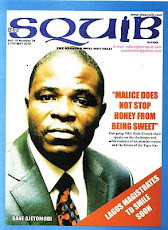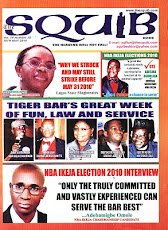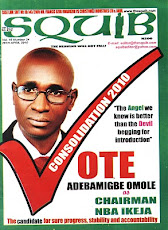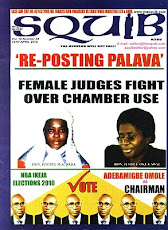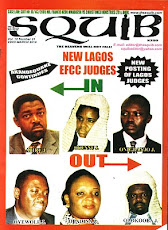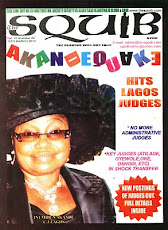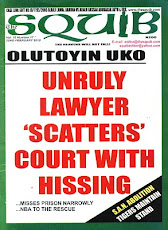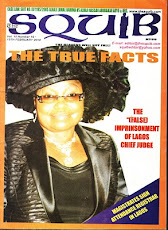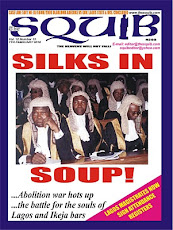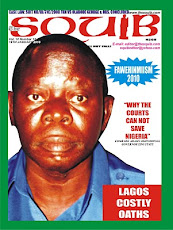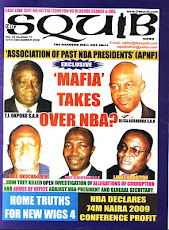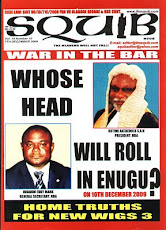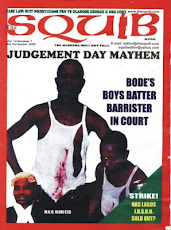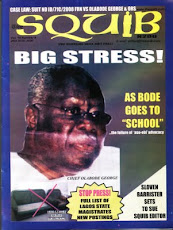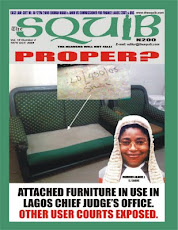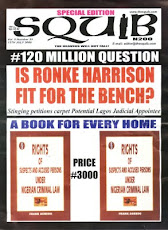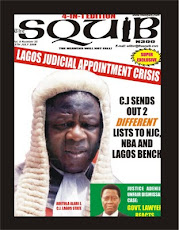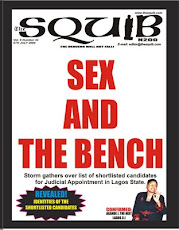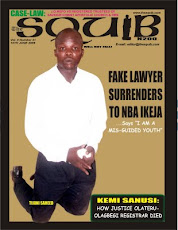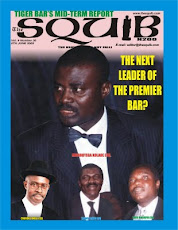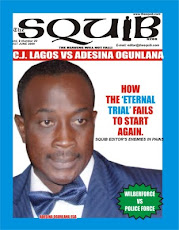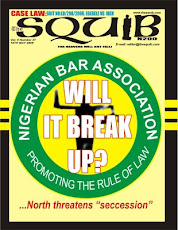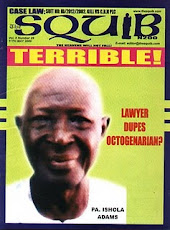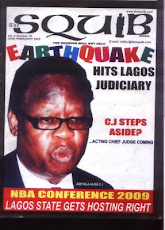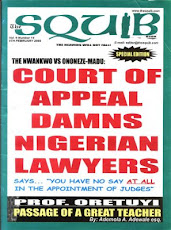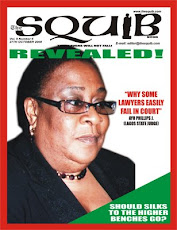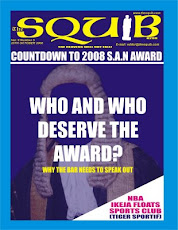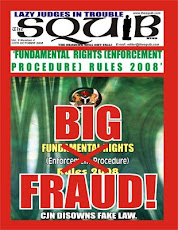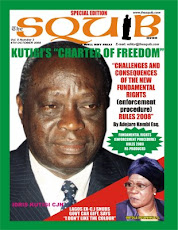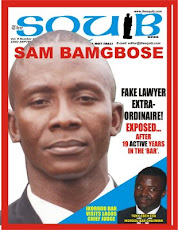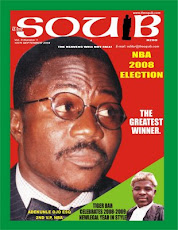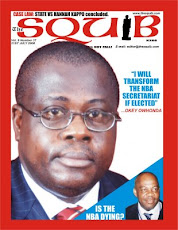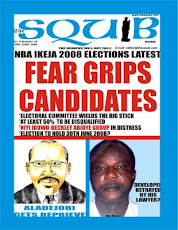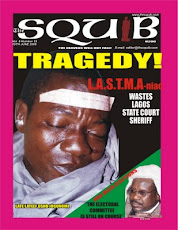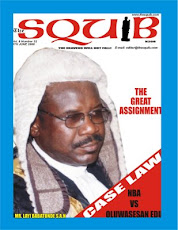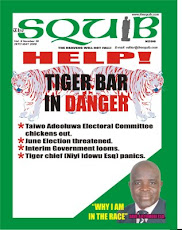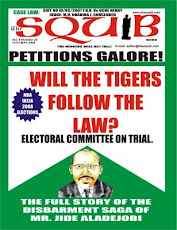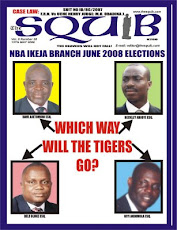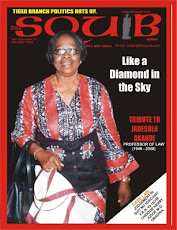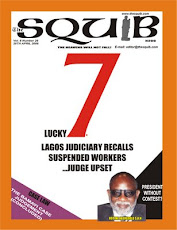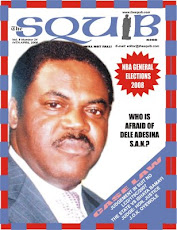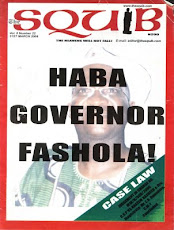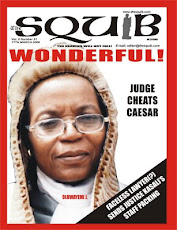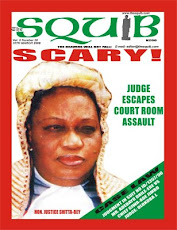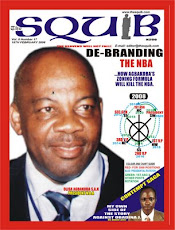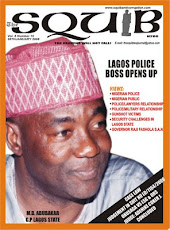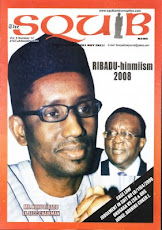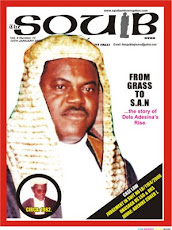
IN THE COURT OF APPEAL
PORT HARCOURT DIVISION
HOLDEN AT PORT HARCOURT
ON MONDAY THE 16TH DAY OF JUNE, 2008
BEFORE THEIR LORDSHIPS
MOHAMMED LAWAL GARBA JUSTICE. COURT OF APPEAL
TIJJANI ABDULLAHI JUSTICE. COURT OF APPEAL
IBRAH1M MOHAMMED MUSA SAULAWA. JUSTICE, COURT OF APPEAL
APPEAL NO. CA/PH/380/2004
BETWEEN:
1. NDIONYENMA H. NWANKWO ESQ. }
2. CHIDIB.NWORKAESQ. }... APPELLANTS
AND
1. MRS ANN C. ONONEZE-MADU } ...RESPONDENTS
2. THE GOVERNOR OE IMO STATE }
3. ATTORNEY GENERAL OF 1MO STATE }
JUDGMENT
(DELIVERED BY TIJJAN1 ABDULLAHL J.C.A.
This is an appeal against the ruling delivered on the 15th March, 2004 in the Suit No. HOW/35/2004, Coram Adigwe, J., sitting at the Owerri Division of the Imo State High Court of Justice.
The Appellants were the plaintiffs at the lower Court whilst the respondents were the defendants. By a writ of summons dated 23rd day of January, 2004 the Plaintiffs (herein the Appellants) sought" the following reliefs against the Defendants (herein the Respondents):
"(a) Declaration that appointing the 1st Defendant a Judge of the High Court of Imo State will infringe on the constitutionally guaranteed fundamental rights of the Plaintiffs to practice their profession in Imo State of Nigeria.
(b) Declaration that the 1st Defendant is not a fit and proper person to be appointed as a Judge of the High Court of Imo State by the 2nd Defendant.
(c) Perpetual injunction restraining the 1st Defendant from presenting herself to the 2" Defendant for appointment and or swearing in as a Judge of the High Court of Imo State.
(d) Perpetual injunction restraining the 2nd Defendant from appointing and/or swearing in the 1s Defendant as a Judge of the High Court of Imo State."
The Appellants' Statement of Claim dated and filed on the 27th February 2004 is contained on pages 4-10 of the Records, while the 211 and 31 Respondents' Statement of Defence wherein they raised preliminary issues of law on jurisdiction of the lower Court can be found on pages 11-13 of the said Record of Proceedings.
The 2nd and 3rd Respondents on 02/03/04 filed a Notice of Preliminary Objection dated 01/03/2004, pursuant to Order 8 Rule 1 and Order 24 Rule 2 of the Imo State High Court (Civil Procedure) Rules 1988 praying the Court for an order striking the said action, on the following grounds;
"(i) The Plaintiffs lack the locus standi to institute this suit;
(ii) The suit is incompetent;
(iii) The Court lacks the jurisdiction to entertain this suit; and
(iv) The suit is speculative and frivolous."
Arguments were proffered by Counsel on both sides on the Preliminary Objection and in a reserved ruling delivered on the 1st day of March, 2004 the learned trial Judge held thus:
"On competence of Court to entertain an action, having found that the plaintiffs lack the locus standi to institute this action and the Court lacks jurisdiction it follows that the suit is incompetent. Indeed in this case, the Plaintiffs have not disclosed cause of action. ......... In the final analysis, the motion by the 2nd and 3rd Defendants succeeds and this suit is accordingly hereby struck out."
Dissatisfied with the decision of the learned trial Judge (supra) the Appellants (1st & 2nd) filed a Notice of Appeal which initially carried three grounds of appeal. With the leave of the Court granted on 27-04-06 ground three of the original Notice and Grounds of Appeal was substituted with another new Ground three of the Notice of Appeal.
Briefs were filed and exchanged. The first Appellant did not file any brief of argument but brief was filed by the 2nd Appellant on the 27 day of April, 2006. The 1s Respondent filed his brief of argument dated 5th day of June, 2006 but filed on 12th day of June, 2006. The brief of the 2nd to 3rd Respondents dated 11th January 2007 was deemed filed by the Order of the Court on 6th February 2007.
It is noteworthy to state at this juncture that from the three grounds of appeal filed by the Appellants, the 2nd Appellant distilled two issues for determination to wit:
"4.01 Whether the learned trial Judge was right in holding that Plaintiffs have no locus standi to institute this action. (Ground one of the Grounds of Appeal).
4.02 Whether the learned trial Judge was right in holding that the Plaintiffs' case was speculative and frivolous and had no cause of action (Grounds 2 and 3 of the Grounds of Appeal)."
The first Respondent also identified two issues for determination which are not dissimilar with the ones filed by the Appellants' Counsel. Learned Counsel for, the 2nd to 3rd Respondents distilled two issues that are identical with the issues formulated by Counsel for the Appellants.
On the 17th day of April, 2005, when the appeal came before us for hearing learned Counsel for the parties did not proffer oral arguments. Each adopted his brief and urged us to either allow the appeal, or dismiss it depending on which side of the divide a Counsel stood for.
On the 1st issue for determination, learned Counsel for the 2nd Appellant began his consideration of the first issue by quoting from AG. Anambra State v Eboh (1991) I NWLR (Pt 218) 491 wherein this Court held thus:
"A person is said to have an interest in a thing when he has rights, advantages, duties, liabilities and loses or the like connected with it, whether present or future, ascertained or potential, provided that the connection and in the case of potential rights and duties, the possibility is not too remote. The question of remoteness depends .on the purpose which the interest is to serve."
Learned Counsel submitted that in view of what has been stated supra, the natural question that should flow there from are: did the Appellants as Plaintiffs show before the lower Court any rights, advantages, duties belonging to them as individuals which the appointment of 1st Respondent as a Judge of the High Court of Imo State would adversely affect either presently or in future?
Again did the Plaintiffs suffer or incur or were about to suffer or incur any loses or liabilities by such appointment? Lastly, was an obligation owed to the Plaintiffs under any law, or duties impose upon the Plaintiffs by any law concerning or which would be affected by the said appointment?
Learned Counsel referred to the Statement of Claim they filed, particularly at pages 4-10 of the records and submitted that in view of the activities of the Appellants which engendered in the 1st Respondent a hostile attitude towards them as amply pleaded in paragraphs 12, 13 and 14 of their Statement of Claim and in view of the fact that the Appellants have the right, as members of the private Bar to practice their chosen profession and have equal and unfettered access to the public service of the land guaranteed under the African Charter and the 1999 Constitution and in view of the peculiar disposition of the 1st Respondent towards the 2nd Appellant and her declared intention as pleaded, can the 2nd Appellant enjoy any of the above rights guaranteed by both African Charter and the Constitution in any Court presided over by the 1st Respondent?
Learned Counsel answered the above question posed in the negative and submitted that in view of the provision of chapter 2 of the Constitution of the Federal Republic of Nigeria of which Section 17 is apart, which creates-an obligation owed by the organs of government, particularly the Court to the citizen of this country including the 2nd Appellant, can it be said that the 2nd Appellant has no locus standi to seek to enforce this obligation owed to him by the organs of government to ensure that these rights so conferred on him by the Constitution are not curtailed or limited, which is presently what the appointment of the 1st Respondent to the High Court Bench will do?
It is the contention of the learned Counsel that being a legal practitioner, like the 1st respondent, the Rules of professional conduct in the legal profession, Rule 21 enjoins them to expose without fear or favour corrupt or dishonest conduct in the profession and should aid in guarding the Bar against the admission to the profession of candidates who are unsuitable by reason of their moral character.
It is the further contention of the learned Counsel that the duty in question is admittedly one which the Appellants share with every other legal practitioner in the country, the fact that they (other -lawyers) neglected to take time and trouble to do same in respect of the 1st Respondent would then be expected to equally keep quite? He answered the question in the negative. He submitted that the apex Court in the cause of Bello v Fayose (1999) 7 SCNJ 286 at 295 and Fawehinmi v Akilu (1987) 4 NWLR (Pt 67) 797 at 855 has decided that every man has a right to litigate his own right and that a man should not be denied this right by the fact that somebody else suing for the same right for his own purpose earlier failed.
It is the submission of the learned Counsel that the lower Court was wrong to have held that the Appellants have no locus standi to institute this action. Whether or not the action would succeed would be determined at the end of trial. But learned Counsel further submitted that it was wrong for the trial Court to send the Appellants out of Court in limine on the wrong view that they lacked the necessary standing to sue. We were urged to reverse the decision of the lower Court and hold that the Appellants had the requisite locus standi to institute the action they did and to remit the suit for retrial on the merits.
For their part, in the brief settled by F. C. Dike (Esq.) on behalf of the 1st Respondent, learned Counsel submitted that locus standi is determined by reference to the statement of claim of the Plaintiffs. The first Respondent, learned Counsel went on concedes the dictum of the Court -of Appeal in the case of Anambra State v Eboh (supra) cited by the Appellants in their brief wherein this Court stated thus:
"A person is said to have an interest in a thing when he has rights, advantages, duties, liabilities, loses or the like connected with it, whether present or future, ascertained or potential, provided that the connection and in the case of potential rights and duties the possibility is not to remote. The question of remoteness depends on the purpose which the interest is to serve." (Underlining supplied for emphasis).
Learned Counsel further submitted that the 2nd Appellant while underlining the first arm of the-dictum in his brief failed to advert to the proviso attaching to "potential rights and duties" and that is the "the possibility is not too remote." This leaned Counsel contended implies that the right should be at least probate if not proximate but certainly not conjectural for where the right is conjectural then it is remote.
Learned Counsel further submitted that the 2nd Appellant while underlining the first arm of the dictum in his brief failed to advert to the proviso attaching to "potential rights and duties" and that is that "the possibility is not too remote". This learned Counsel contended implies that the right should be at least probable if not proximate but certainly not conjectural for where the right is conjectural then it is remote.
Learned Counsel referred to Sections 158 (1) and 271 (2) of the Constitution of the Federal Republic of Nigeria, 1999 in relation to paragraph 23 of the Statement of Claim and argued that the Appellants,-did not challenge the competence of the National Judicial Council to make recommendation nor did they challenge the Governor of Imo State as not being competent to appoint under Section 271 of the Constitution; nor declare that they are contestants or even they have any person in mind. They have not attacked the process of appointment, all they said was that they are
lawyers and might appear before the 1st respondent. Learned Counsel submitted that this very remote and to borrow a phrase used in another context this does not show any clear and present danger to their right whether now or in the future but fertile imaginations of their minds. Learned Counsel relied on the case of (Dr.) Irene Thomas v Most Reverend Olufosoye (1986) 2 SC 325 at 330; 350 - 352 and 361 at 368.
In a brief settled by Learned Counsel for the 2nd and 3rd Respondents, A. N. Eluwa (Mrs) Director of Civil Litigation, Ministry of Justice, Imo State, learned Counsel submitted that it cannot be rightly contended, as the Appellants have done, that they possess the requisite locus standi to institute this action. The Appellants' interest in the matter, learned Counsel further submitted is vague. They have not shown that they have any special interest over and above that of the general public, sufficient to clothe them with standing to sue.
Learned Counsel submitted that whether or not the Appellants have locus standi to sue is a matter to be determined on the pleadings. The question to be asked, the learned Counsel went on is what are the averments in the statement of claim that depict special interest on the part of the Appellants to sue? The statement of claim of 28 paragraphs (pp 4 - 10 of the Records) refers to extraneous matters, criminal allegations against the 1st Respondent,
1st Respondent's perceived hostility towards them and chronicles the modalities for appointment of Judges in the State. The Appellants averred in paragraph 1 of the statement of claim that they are members of the Nigerian Bar Association, Owerri Branch. Learned Counsel further submitted that this proposition ipso facto does not place them in any peculiar position, above the generality of the public in the appointment of a Judge of the High Court of Imo State.
It is the submission of the learned Counsel that for a person to have legal capacity to sue in a matter, it has to be clearly shown to the Court that his rights and obligations have been or are about to be or are in the imminent danger of being violated or invaded or adversely affected by the act complained of. She relied on the case of Odeneye v Efunuga (1990) 7 NWLR (Pt. 164) 618 at 630 - 631paragraphs G – E.
Learned Counsel urged us to revolve issue No. 1 in the affirmative and. uphold the ruling of the lower Court and dismiss the appeal on this issue.
Now, locus standi is defined in Blacks' Law Dictionary, Eight Edition, p. 960 to mean:
(Latin "Place of Standing"). The right to bring an action or to be heard in a given forum. STANDING."
This phrase has been judicially interpreted in a long chain of decided authorities by our Court of law to mean the legal capacity to institute proceedings in a Court of law. Thus a person will have capacity to sue in a matter in which it has been clearly shown to the Court that his rights or obligations have been or about to be or are in imminent danger of being violated or invaded or adversely affected by the act complained of regard being had to Section 6 (6) (b) of the 1999 Constitution of the Federal Republic of Nigeria.
Put differently, locus standi means legal capacity to institute proceedings in a Court of law. It is used inter-changeably with terms like "standing" or "title to sue". Failure to disclose any locus, standi is as fatal to an action or is failure to disclose any reasonable cause of action. See the cases of Adesanya v The President of The Federal Republic Of Nigeria (1981) 2 NCLR 358; 1981 1 ANLR (Pi 7, 1; or (1985) 5 SC 112, Gamioba & Ors v Esezi & Ors (1961) 2 SCNLR 237; Dr. Irene Thomas v
Olufosoye (1986) (Pt. 18) 669.
It is now settled law that whether or not a Plaintiff has locus standi to sue in a matter is to be determined on the pleadings. The question that must be asked and answered is which are the averments in the Statement of Claim that show special interest on the part of the Appellants to sue?
A careful reading of the statement of claim contained on pages 4 - 10 of the record would leave no one in any doubt that same have not disclosed any special interest that would clothe the Appellants with the right to institute the action in contention.
In the case of (Dr.) Irene Thomas v Most Reverend Olufosoye (1986) 2 SC 325 at 330, 350 - 352 and 361 -368, it was held thus:
"It is also the law as laid down in that to entitle a person to invoke judicial power, he must show that either his personal interest will immediately be or has been adversely affected by the action or that he has sustained or is in immediate danger of sustaining an injury to himself and which interest and injury is over and above that of the general public."
In the case of (Dr.) Irene (supra), they averred in paragraph 6 of their statement of claim that:
"The appointment of Adetiloye was made contrary to provisions of Article IV of Church of Nigeria........ 1979."
Inspite of that, the Supreme Court affirmed the judgments below that they had no locus standi and that the averment in paragraph 13 of the Statement of Claim that they are not interest in any particular candidate worsened matters for them.
Again, in the case of Senator Abraham Adesanya v The President of the Federal Republic of Nigeria (supra) the Appellant, Senator Adesanya of blessed memory instituted an action challenging the powers of the then President of the Federal Republic of Nigeria in appointing the 2nd Respondent, the Hon. Justice Victor Ovie-Whiskey of blessed, the Chairman of the Federal Electoral Commission, the apex Court per Bello, JSC (as he then was) of blessed memory too, whilst interpreting the provisions of Section 6 (6)(b) of the 1979 Constitution which are in para materia with the provisions of Section 6 (6) (b) of the 1999 Constitution held thus:
"It may be observed that this subsection expresses the scope and content of the judicial powers vested by the Constitution in the Courts within the purview of the subsection. Although the powers appear to be wide, they are limited in scope and content to only matters, actions and proceedings, 'for the determination of any question as to the civil rights and obligations of that person. It seems to me that upon the construction of the subsection, it is only when the civil rights and obligations of the person, who invokes the jurisdiction of the Court, are in issue for determination that the judicial powers of the Courts may be invoked. In other words, standing will only be accorded to a Plaintiff who shows that his civil rights and obligations have been or are in danger of being violated or adversely affected by the act complained of. The Appellant has not alleged that the appointment of the second Respondent has in any way affected or is likely to affect his civil rights and obligations.”
The learned Counsel for the Appellant, has argued in his brief that the 1st Respondent openly declared to what use she would put the said office of Judge of the High Court when so appointed:- to deal "ruthlessly with the Appellants who were still practicing lawyers in Imo State."
The Appellants argued that it is not too remote that Appellants may appear before the 1st Respondent and this, according to the learned Counsel gives them the necessary locus standi to institute the action in contention.
With due respect to the learned Counsel, the argument (supra) is self-serving as the 1st Respondent is/was a serving Magistrate and it cannot be said that they may not appear before her and it is difficult to imagine how elevating her to a higher bench would make the infraction of their rights or liabilities more proximate.
Again, learned Counsel strenuously argued that the organs of government, particularly Courts owe the citizen of this country including the 2nd Appellant to conform and observe the African Charter on Human Rights. He proceeded to conclude that the appointment of 1st Respondent to the High Court Bench ill infringe that duty to him. However, he did not show how his right is over and above that of other citizens which 1st Respondent is also.
From the facts of the case as contained in their statement of claim, the Plaintiffs/Appellants are legal practitioners of Private Bar members of the Nigerian Bar Association Owerri Branch and members of Lawyers Forum, an Association of some lawyers in Owerri, Imo State. I am of the considered opinion that the Appellants have no role in the process of appointing a State High Court Judge. I must therefore agree with the learned trial Judge when he held thus:
"It appears to me that the Plaintiffs in bringing this suit tried to ascribe to themselves a role, duty and responsibility in matter of appointment of a High Court Judge in Imo State which the Constitution has clearly vested on 3 bodies earlier enumerated. They have not the locus standi to do so."
In the light of that I have said this issue must be and it hereby resolved in favour of the Respondents and against the Appellants.
Issue No; 2 for determination is whether the learned trial Judge was right in holding that the Plaintiffs' suit lacked a cause of action and was .speculative and frivolous.
Learned Counsel for the Appellants after referring to the writ of summons and some paragraphs of the statement of
claim argued that the reliefs sought are in the main a declaration of right, a declaration of a state of affairs and then the consequential injunctive reliefs. No where in those claims did the Appellants ask that they and not the 1st Respondent, should rather be appointed to the Bench of the Imo State Judiciary. No where did the Appellants allege that the bodies or authorities responsible for the appointment of Judges had no power to do so.
Learned Counsel argued that the trial Judge completely ignored the facts pleaded by the Appellants in their statement of claim and went on a frolic of quoting Constitution provisions as to which statutory bodies are set up with responsibility of appointing Judges, the fact that Appellants were not members of those bodies; the fact that the Constitution did not assign the Appellants any roles to play in the appointment of Judges were neither here nor there, the learned Counsel further argued.
It is contention of the learned Counsel that the trial Judge misunderstood the case of Appellants. The suit, learned Counsel further submitted did not challenge the exercise by the Governor of his statutory power to appoint Judges. The suit simply prayed the trial Court to declare that based on the facts pleaded, 1st Respondent's moral conduct and threat against the Appellants is such that she is not fit and proper to be appointed a Judge of the High Court of Imo State. Sequel to that is the prayer to restrain the Governor from exercising his power to appoint in favour of such an unfit person; which the Court can grant or refuse at the end of the day.
Learned Counsel contended that the learned trial Judge totally ignored the facts actually pleaded in the Statement of Claim before him in support of the prayers sought by the Appellants. He set out by himself what he thought the Plaintiffs/Appellants ought to have pleaded then held that having not pleaded those facts he set out, their case was frivolous and lacked a cause of action. Learned Counsel further contended that such argument was ridiculous and urged us to reject same.
Learned Counsel urged us to hold that the learned trial Judge was in grave error to have held that there was no cause of action and that the suit was speculative and frivolous. He urged to revolve this issue in favour of the Appellants.
On this issue, learned Counsel for the 1st Respondent submitted that the statement of claim is laden with allegations of third parties which they have coaleased as the Plaintiffs/Appellants grievances. All in all the Plaintiffs/Appellants did not declare any special interest or role in the appointment save their morbid allegation of fear in paragraph 16 of the statement of claim.
Learned Counsel for the 2nd to 3rd Respondents submitted that the Appellants were merely speculating that the 2nd Respondent will appoint the 1s respondent as a Judge of Imo State Judiciary. The Appellants anchored their relief "A" purely on speculation which cannot avail them with a cause of action and which the apex Court has held in along line of cases that our Courts should refrain from entertaining. He referred us to the case of Onochie v Odogwu (2006) ALL FWLR (Pt 317) 544 at 579, paragraph 13, Nkwocha v Governor, Anambra State (1984) 6 SC 362; EZEANYA v OKEKE (1995) 4 NWLR (Pt 388) 142; Archibong v The State (2006) ALL FWLR (Pt 323, 1747 at 1773 paragraphs A-C.
Learned Counsel submitted that in the exercise of statutory function, action will not lie, unless and until the person entitled to exercise such function has done so in violation of the enabling law, See Okafor v A.G. Anambra State (1992) NWLR (Pt 224) 395.
It is the submission of the learned Counsel that the 2nd Respondent was yet to exercise his statutory function of appointing a person a Judge by the Imo State Judiciary when the Appellants initiated the suit and this makes the suit frivolous, vexatious, speculative and robs the lower Court of the jurisdiction to entertain the suit, see Akilu v Fawehinmi (No.2) (1989) 2 NWLR (Pt. 102) 122 at 13 5 paragraph B.
clt is now settled law that a cause of action is the entire factual situation the existence of which entitles one person to obtain from the Court a remedy against another person. See the case of A.G. Kwara State v Olawole (1993) 1 NWLR (Pt, 272) 645 at 663 paragraphs A - C
Again, in the case of Rinco Construction Co. Ltd v Veepee Industries Ltd (2005) ALL FWLR (Pt 264) 816 at 822, paragraphs C-D the apex Court held thus:
“Cause of action is the entire set of circumstances giving rise to an enforceable claim, it is effect the fact or combination of facts which give rise to a right to sue, and it consists of two elements:
(a) The wrongful act of the Defendant which gives the Plaintiff his cause of complaint; and
(b) The consequent damage."
The question to be asked is; what was the wrongful act of the Respondents and the consequent damage to the Appellants? With regard to relief "A" of the Appellants' claim, they were merely speculating that the 2nd, Respondent will appointment the 1st Respondent as Judge of the Imo State Judiciary. I am of the strong view that the Appellants anchored their relief "A" on speculation which cannot avail them a cause of action.
In the case Madukolu v Nkemdilim (1962) 2 SCNLR, 341, the apex Court held that for a Court to have jurisdiction, the following conditions must be met:
"i) It is properly constituted as regards numbers and qualifications of the members of the Court and no member is disqualified for one reason or the other;
ii) The subject matter of the case is within its jurisdiction, and there is no feature in the case which prevents the Court from exercising its jurisdiction; and
iii) The .case comes before the Court initiated by due process of law, and upon fulfilment of any condition precedent to the exercise of jurisdiction."
I am of the firm view that since the 2" Respondent was yet to exercise his statutory function of appointing a person as a Judge of the High Court of Imo State when the Appellants instituted the suit, that alone removes the subject matter of the suit from the jurisdiction of the lower Court and robs the Court of the competence to hear the suit because competence is intrinsic to adjucation.
In the light of all that I have said this issue like the previous one is resolved in favour of Respondents and against the Appellants.
In sum, with all the issues resolved in favour of the Respondents, this appeal fails and it is dismissed accordingly with N30,000.00 costs to the Respondents.
TIJJANI ABDULLAHI
JUSTICE, COURT OF APPEAL
COUNSEL:
C. E. Anyanwu for the 1st Appellant holding the brief Chidi B. Nworka Esq.
Chidi B. Nworka Esq. appears in person. F. C- Dike with Amadi for the 1st Respondent
A. N. Eluwa (Mrs) DCL (Imo State) for 2nd & 3rd Respondents.
APPEAL NO: CA/PH/380/2004
MOHAMMED LAWAL GARBA, JCA
I was privileged to read the lead judgment written by my learned brother ABDULLAHI, JCA and I agree with his reasoning and conclusion.
He has meticulously dealt with the salient issues for determination, so I have nothing to add. 1 abide by the orders made in the lead judgment.
M. L. GARBA
JUSTICE, COURT OF APPEAL
IN THE COURT OF APPEAL
PORT HARCOURT DIVISION
HOLDEN AT PORT HARCOURT
ON MONDAY THE 16TH DAY OF JUNE, 2008
BEFORE THEIR LORDSHIPS
MOHAMMED LAWAL GARBA JUSTICE. COURT OF APPEAL
TIJJANI ABDULLAHI JUSTICE. COURT OF APPEAL
IBRAH1M MOHAMMED MUSA SAULAWA. JUSTICE, COURT OF APPEAL
APPEAL NO. CA/PH/380/2004
BETWEEN:
1. NDIONYENMA H. NWANKWO ESQ. }
2. CHIDIB.NWORKAESQ. }... APPELLANTS
AND
1. MRS ANN C. ONONEZE-MADU } ...RESPONDENTS
2. THE GOVERNOR OF IMO STATE }
3. ATTORNEY GENERAL OF IMO STATE }
DISSENTING JUDGMENT
(BY IBRAHIM MOHAMMED MUSA SAULAWA. JCA)
I had read before now the lead judgment delivered by my learned brother ABDULLAHI, JCA.
As could be gleaned from the record of proceedings of appeal, both Appellants has on 04/5/05 filed suit NO- HOW/35/2004 against the two Respondents in the lower court seeking the following reliefs:
1. Declaration that appointing the 1st Defendant as a judge of the high Court of Imo State will infringe on the constitutionally guaranteed fundamental rights of the Plaintiffs to practice their profession in Imo State of Nigeria.
2. Declaration that the 1st Defendant is not a fit proper person to be appointed as a judge of the High Court of Imo State by the 2nd Defendant.
3. Perpetual injunction restraining the 1s1 Defendant from presenting herself to the 2nd Defendant for appointment and/or swearing as a judge of the High Court of Imo State.
4. Perpetual Injunction restraining the 2nd defendant from appointing and/or swearing in the 1st Defendant as a judge of the High Court of Imo State.
On 27/01/04, the Appellants also filed in the lower court a motion on Notice seeking the following interlocutory reliefs:
1. An Order of interlocutory Injunction retraining the 1st Defendant/Respondent from presenting herself for appointment and/or for swearing in as a Judge of the High Court of Imo State, pending the determination of the substantive matter.
2. An Order of interlocutory Injunction restraining the 2nd Defendant/Respondent from appointing and/or swearing in the 1st Defendant/Respondent as a judge of the High Court of Imo State pending the determination of the substantive suit.
However, prior to the determination of the above motion, a Notice of preliminary objection dated 01/3/04 was filed on 02/3/04 in the lower ourt by the two Respondents seeking an order to strike out the suit on he ground that:
"(i) the Plaintiffs lack the locus standi to institute this suit;
(ii) the suit is incompetent;
(iii) the court lacks the jurisdiction to entertain this suit;
(iv) the suit is speculative and frivolous."
At the conclusion of the hearing of the preliminary objection inquestion, the lower court delivered a ruling thereupon on 15/3/04 to the effect, inter alia, thus:
On competence of court to entertain an action. Having found that the Plaintiffs lacks the locus to institute this action and the court lacks jurisdiction it follows that the suit is incompetent. In deed in this case, the Plaintiffs have not disclosed cause of action.
... I hold that this suit is speculative and frivolous. The exercise of the constitutional power of the Governor to appoint the I5' defendant a judge of the High Court has not
been done...
In the final analysis the motion by the 2nd and 3rd defendants succeeds and this suit is accordingly hereby spind out. Plaintiffs are to pay the I5' Defendant costs of (N5,000.00) Five Thousand Naira. No Order for cost in favour of the 2nd and 3rd defendants.
Being dissatisfied with the said ruling, the Appellants filed their Notice of Appeal and grounds of Appeal dated 18/3/04 in the lower court on 23/3/04, With the exception of the 1st Appellant the 2nd Appellant, the 1st Respondent, as welt as the 2nd and 3rd Respondents had filed their respective briefs of argument, The first of the two issues formulated by the 2nd Appellant in the brief thereof raises the question of whether the learned trial judge was right in holding that the Appellants have no locus standi to institute the action inquestion. That issue was distilled from ground one of the Grounds of Appeal. The 2nd Appellant, who appeared in person, has in the brief thereof alluded to various authorities the principles relating to locus standi, He cited most especially, the cases of BELLO VS FAYOSE (1999) 7 SCNJ 286 at 295; FAWEHINMI VS AK1LU (1987) NWLR (part 67) 797 at 855, et al; Article 13 (2) & (3) of the African charter on Human And People's Rights. Sections 13 and 17 (2) (a) of the Constitution of the Federal Republic of Nigeria. 1999; Rule 21 of the Rules of professional conduct for the Legal Practitioners, to the effect that the Appellants have the necessary locus standi to file the action. According to the 2nd Appellant:
Appellants amply and clearly pleaded in their statement of claim these rights, obligations duties losses and liabilities of theirs which would be infringed by the appointment of the 1st Respondent to the higher beach of the Imo State judiciary. The Hon. Court of Appeal is hereby urged to reverse the decision of the lower trial court and hold that the Appellants had the requite (sic) locus standi to institute the action they did, and to remit the suit for trial on the merits.
Issue No,1 formulated by 1" respondent and 2nd & 3rd Respondents in their respective briefs is not mutually exclusive with 2nd Appellants'. The 1st Respondent's learned counsel FC. Dike Esq. in particular made reference to the case of ANAMBRA STATE VS EBOH (1992) INWLR (part 218) 491 at 505; THOMAS VS OLUFOSOYE (1986) 2 SC 325 at 330; 350 - 352; 361 - 368; GARBA VS UNIVERSITY OF MAIDUGURI (1986) INWLR (part 18) 550;
SCHINDEM1 VS GOV. OF LAGOS STATE (2006) ALL FWLR (part 311) 1858 at 1874 paragraphs G - H et al; SS. 17 (2), 158 (1) & 271 (2) of the 1999 Constitution; and the averments contained in the statement of claim to the effect that the Appellants have failed to disclose any infringement of procedure for appointment or that they are contestants or have any person in mind who's of qualified. That its therefore difficult to say on the pleadings whether the Appellants have any locus standi in the appointment of the 1st Respondent. The court has been urged to accordingly hold that the appeal fails on issue No.1.
On the other hand. the 2ncl & 3rd Respondent's learned counsel. AN ELuwa (Mrs.) Director Civil Litigation Imo State Ministry of Justice submitted, inter alia, in the brief thereof, thus:
... the position of the law is that where a Plaintiff is bereft of locus standi and competence to institute an action, the secure is incompetent and must of necessity be struck out. A cursory look through the whole gamut of Plaintiff's averments in the statement of claim which collectively from the bed rock of their claim, does not disclose sufficient interest, clothing them with locus standi to institute this action.
'The learned counsel has token the liberty of alluding to various authorities to the effect that failure to disclose any locus standi is as fatal to an action, as is failure to disclose any reasonable cause of action, See ADESANYA VS THE PRESIDENT OF FED. REPUBLIC OF NIGERIA (1981) 2 NCLR 358; (1981) ANLR (part 1) 1; (1985)5SC 112; GAMIOBA & ORS VS ESEZI & ORS (1961) 2 SC NLR 237; THOMAS VS OLUFOSOYE (supra);
it was further submitted that for a person to hove the legal capacity to sue in a matter, he has to show to the court that his rights or obligations have been or are about to be, or are in imminent danger of being violated, or invaded, or adversely affected by the act complained of. See ODENEYE VS EFUNUGA (1990) 7 NWLR (part 164) 618 at 630 - 631 paragraphs G - E; ETALUKU VS NBC PLC (2005) ALL FWLR (part 261) 353 at 378 paragraphs B ~ C.
It was contended that the provisions of Section 13 (2) & (3) of the African Charter on Human And People's Right relied upon by 'the Appellants is subject to the provisions of the 1999 Constitution. That since the Appellant have not argued that section 271 (2) & (3) of the 1999 Constitution was in any way violated by the 2nd and 3rd Respondents, they can not invoke the African charter on Human And People's Rights to over ride the clear provisions of the 1999 Constitution. The court has been urged upon to thus resolve issue No.1 in the positive, Undoubtedly, the word 'Locus' in Latin means a place i.e. the place or position where something is done or exists. On the other hand, the word standi denotes standing. Thus, the term 'locus stand' means -"place of Standing." It denotes the right to bring an action or to be heard in a given forum. It is often popularly referred to as standing to sue or standing, for short, Thus, locus standing simply denotes a party's right to make a legal claim or seek judicial enforcement of a duty or right. See BLACK'S LAW DICTIONARY, 7th EDITION, 1999.
It is now settled that in ascertaining whether the Plaintiff in a case has the necessary locus standi to institute the action, it is the statement of claim which the court has to look at, with a view to finding out whether it discloses any cause of action vested in the Plaintiff, Where , however, the action is commenced by an originating summons, it's the affidavit in support thereof that will be examined to determine whether or not the Plaintiff has a locus standi. See ADESOKUN VS ADEGOROLU (1997) 3 NWLR (part 493) 261; BOLAJI VS BAMGBOSE (1986) 4 NWLR (part 37) 632; FAWEHINMI VS PRESIDENT OF THE FEDERAL REPUBLIC OF NIGERIA &
4 ORS (2007) 14 NWLR (part 1054) 275 at 329 -330 paragraphs H " B; 331 paragraph B.
I think, there is a need to reiterate the trite cardinal principle that the issue of locus standi is a condition precedent, and thus fundamental to the determination of any action before a court. It is rather a reshold which deeply goes to the root of the entire action vis-a-vis the Jurisdiction of the court itself. This principle was enunciated by this court in CBN VS KOTOYE (1994) 3 NWLR (part 330) 73 paragraphs C - D per Kalgo JCA (as he then was) thus:
"Locus stand! affects the jurisdiction of that court before which an action is brought because if there is no locus stands to fife the action in the first place, the court can not properly found jurisdiction to entertain the matter."
See also ADESANYA VS PRESIDENT FRN (2001) FWLR (part 46) 859; OGBUCHI & ORS VS GOV.OF IMO STATE & ORS (1999)NWLR (part 417) 53 at 87; ELASO VS GOVL OF OGUN STATE & ORS (1990) 2 NWLR (part 133) 420, respectively.
In the instant case, the Appellant's Statement of claim dated 27/02/04 and tiled on that date, could be found at pages 4 - 10 of the Record of proceedings of the lower court. I hove critically, albeit, dispassionately, perused same. The statement of claim consists of 28 paragraphs and the reliefs sought therein. Paragraphs 1. 13, 14, 15, 16. 17, 18, 23, 25 26, and 27 of the said statement of claim are in my view germain to the vexed issue of locus stand!, and I have deemed it expedient to reproduce them here under thus:
1. Plaintiff are legal practitioners of the private bar, members of the Nigerian Bar Association, Owerri Branch, and members of Lawyer Forum, an association of some layers in Owerri, Imo State.
13. The Plaintiffs were and have remained at the forefront of exposing this fraud perpetrated by 1s1 Defendant on the Imo State judiciary and Government. The I.C.P.C. relied to the letter from lawyers Forum in its letter ICPC/P/SE/193/2002 of 16th August 2002, saying if was investigating the matter. The Imo JSC invited Plaintiffs vide its letter of 23rd July 2002, July, 2002 in the office of the Chief Judge of Imo State. At this meeting both Plaintiffs spoke strongly against the fraud of 1st Defendant and insisted that same be redressed. It turned out that most of the members of the JSC had no idea of the fraud comprised in 1st Defendant obtaining promotion to the post of Chief Magistrate by false pretence, and the fact that she had been paid arrearsrs of salary in respect of same.
14. Plaintiffs were also invited by the Imo State House of Assembly when its committee on the Judiciary commenced an investigation into the tenure of Justice Alinnor as acting and substantive Chief Judge of Imo state, vide its letter dated 24th July, 2002. Plaintiff honoured the invitation and thereat also spoke extensively against this said fraud of the 1st Defendant. This proceeding received wide publicity as several members of the were in attendance. The said House Committee on the Judiciary has issued a report recommending inter alia that 1s' Defendant be charged with obtaining by false pretences and be made to refund the money she was paid.
15. In the year 2000, on Chief P.C. Onuha instituted an action at the Federal High Court Port Harcourt, against Justice Alinnor and 4 others persons. 2nd Plaintiff was counsel to the Plaintiff in that suit registered as FHC/PH}CSf128{2000: CHIEF P. C. ONUOHA VS HON. JUSTICE L.C. ALINNOR & 4 ORS. The question of this fraud by the 1st Defendant, with the active connivance of Justice Alinnor, was a prominent issue In the said suit which was infer alia for a declaration that Justice Alinnor was not fit and proper to be appointed the Chief Judge of Imo State.
16. 2nd Plaintiff as counsel in the said Federal High Court Suit, successfully moved a motion in the said suit for the Imo State JSC and Chief Registrar of the Imo State High Court to produce and tender in that court all the documents relating to or concerning this said fraud of the 1st Defendant. 1s' Defendant was fully briefed by Justice Alinnor about this, following which her entire attitude towards 2nd Plaintiff, previously very warm and cordial, turned frosty and absolutely hostile. 1st Defendant has openly declared that she was quote:
"Anu ana 'gba egbe ya na fa chin gum" meaning "An animal who chews chewing gum under gun fire"; that with the backing of the Chief Justice of Nigeria, Plaintiffs and the NBA could go to hell and that it was a matter of time before she would be in a position to deal "ruthlessly" with Plaintiffs who seem to have forgotten that they are still practicing lawyers in Imo State, and dared to oppose her candidacy for judgeship, which appointment is a settled issue.
17. 1st Defendant's predilection to fraud and corruption is not of recent origin. 1st Defendant's entire career as a magistrate is characterized by incidents of bribery, demanding and receiving money from litigants; extorting money from accused persons on the pain of arbitrary refusal and at times cancellation of bail; blackmailing litigants under threat of adverse judgments and rulings against them, to debrief their solicitors who have dared to come between her and whatever money she demanded from such lawyer's clients, etc. Series of petitions were written by several Sawyers against the 1st Defendant for these sordid deeds. Under the reign of Justice Alinnor, these petitions did not see the light of day.
18. In one case, L.C. Ike Esq. wrote to the Chief Registrar a petition tiled; "RE: ROT AT THE LOWER BENCH: IN THE MATTER OF C.A. ONONEZE MADU (MRS): PETITION FOR DISMISSAL FROM SERVICE" dated 30th September, 1999. The Chief Registrar endorsed this petition to 1st Defendant and requested for her response. This petition contained series of misdeeds by 1st Defendant in several cases, not just one. Justice Alinnor heavily descended upon and viciously chastised the poor Chief Registrar for daring to request his dearly beloved 1st Defendant to respond to the petition against her. He went further to personally draft a reply to the petition addressed to L.I. Ike Esq., with reference no. JD.2623/P/78 and dated 24"1 November, 1999, put the Chief Registrar's name and tried to force her to sign and dispatch same. The Chief Registrar valiantly refused so to do.
23. For quite some time now there has existed a need to appoint more judges to the High Court of Imo State. The procedure for the appointment of judges to the Judiciary of a State includes; candidates being recommended to the Chief Judge of the State who compiles and presents a list of such candidates to the Judicial Service Commission of the State. Either before or after the exercise by the JSC, the list is presented to the Nigerian Bar Association branches in the state for their impute with respect to which candidate is fit or unfit for appointment. Next, the State JSC sends the approved list to the National Juridical Council which would then recommend same to the Governor of the State. If is the Governor that now appoints such candidates or any number of them as he may deem fir, as judges and siveor them in as judges of the High Court of the State.
24. The Imo State branches of the NBA categorically and unanimously stated in their impute, that 1s' Defendant was NOT APPOINTABLE as a judge of the High Court of Imo State. The NBA in Imo State through their various representatives made it very clear that the 1st Defendant by every criteria is not a fit and proper person to be appointed as a judge of the High Court of Imo State.
26. This position by the NBA in Imo State has been supported, adopted and reemphasized by the National Executive Committee of the Nigerian Bar Association-National. The National President of the NBA, Chief Wole Olanipekun S.A.N. in fact made it clear to the Chief Justice of Nigeria both orally and in writing, that the 1st Defendant IS NOT FIT for appointment as a judge of the High Court of Imo State. The said National President made this abundantly clear in his speech delivered at the last Annual Conference of the NBA held in Enugu in August 2003.
27. Despite the deluge of evidence of 1st Defendant's corrupt practices; despite the horde of views and opinions expressed on the character of V9 Defendant, despite the fact that 1s1 Defendant's conduct is the subject of an investigation by the I.C.P.C.: despite the fact that these facts and evidence were variously made known to the National Judicial Council, the said NJC on the 131'1 of January 2004, still went ahead to include the 1s' Defendant as one of the candidates if recommended to the 2nd Defendant for appointment as a judge of the High Court of Imo State. Undoubtedly, the above paragraphs speak for them selves. It is rather obvious from the above averments, that the Appellants as members of the legal profession, members of the Nigerian Bar Association and Lawyer Forum Owerri Branch, have the right to be passionately interested in the caliber of persons that were to be appointed as judicial officers and staff to man the Imo State judiciary.
It is indeed trite that under public law, in an action seeking to protect or assert a public right or to enforce the execution or performance of a public duty, it' is the Attorney General of the Federation or of a State, as the case may be, that usually has the requisite locus standi to sue. See most especially sections 150 (1) and (2); 174 (1) (2) and (3) of the 1999 Constitution (supra) regarding the powers conferred upon the Attorney Generation of the Federations thus:
150(1) There shall be an Attorney -General of the Federation who shall be the Chief Law Officer of the Federation and a Minister of the government of the Federation
[2] A person shall not be qualified to hold or perform the functions of the office of the Attorney-General of the Federation unless he is qualified to practice as a legal practitioner in Nigeria and has been so qualified for not less than ten years.
174 (1) The Attorney-General of the Federation shall have power
(a) to institute and undertake criminal proceeding against any person before any court of law in Nigeria, other than a courf-marfiaf, in respect of any offence created by or under any Act of the National Assembly:
(b) to take over and continue any such criminal proceedings that may have been instituted by any other authority or person; and
(c) to discontinue at any stage before judgment is delivered any such criminal proceedings instituted or undertake by him or any other authority or person.
(2) The powers conferred upon the Attorney-General of the Federation under subsection (1) of this section may be exercised by him in person or through officers of this department.
(3) In exercising his powers under this section, the Attorney-General of the Federation shall have regard to the public interest, the interest of justice and the need to prevent abuse of legal process.
It is note worthy, that similar powers have also been conferred upon the Attorney General of a State under sections 195 and 211 of the 1999 Constitution, to wit:
195.(1) There shall be an Attorney-General for each State who shall be the Chief Law Officer of the State Commissioner for Justice of the Government of that State.
(2) A person shall not be qualified to hold perform the function of the office of the Attorney-General of a State unless he is qualified to practice as legal practitioner in Nigeria and has been so qualified for not less than fen years.
211.(1) The Attorney-General of a State shall have power-
(a) to institute and undertake criminal proceedings against any person before any court of law in Nigeria other than a court-martial in respect of any offence created by or under any law of the House of Assembly;
(b) to fake over and continue any such criminal proceedings that may have been instituted by any other authority or person; and
(c) to discontinue at any stage before judgment is delivered any such criminal proceedings instituted or undertaken by him or any other authority or person
(2) The powers conferred upon the Attorney -General of a State under subsection (1] of this section may be exercised by him in person or through officers of his department.
However, in exceptional circumstances, especially where an individual can sue personally he has to show that he suffered special damage over and over that which was suffered by the generality of the public. See GAMIOBA VS ESEZI (1961) 2 SCNLR 237; OWODUNMI VS REGISTERED TRUSTEES OF CELESTIAL CHURCH OF CHRIST (2000) 10 NWLR (part 675) 315; FAWEHINMI VS PRESIDENT OF FRN (supra) at 333 paragraphs G - H.
By way of a relator action however, an individual can only file an action where the Attorney General grants a fiat thereto in his name.
It is rather pertinent that the Appellants, as legal practitioners, have an onerous obligation not only to uphold, but also to observe the rule of law, promote and foster the cause of justice, maintain a high standard of professional conduct and to shun any conduct which is unbecoming of a legal practitioner. See Rule 1 of the Rules of Professional Conduct For Legal Practitioners made pursuant to the provisions of the Legal Practitioners Act (CAP.20 Laws of the Federation of Nigeria, 1990).
Most undoubtedly, the above provision of Rule 1 (supra) was meant to make the noble and learned profession (legal profession) not only a vibrant and an honourable profession, but also a formidable watch dog of the public service, in particular, and the society in general, As alluded to above, it is trite that the principle of locus standi is traceable to the provisions of section 6 (6) (a) and (b) of the 1999 Constitution which ) provides thus:
6. _________________________.
(6) The judicial powers vested in accordance with the foregoing provisions of this section -
(a) shall extend, not withstanding anything to the contrary in the constitution, to all inherent powers and sanctions of a court of law.
(b) shall extend to all matters between persons, or between government or authority and to any person in Nigeria, and to all actions and proceedings relating thereto, for the determination of any question as to the civil rights and obligations of that person;
The learned counsel to the 2nd and 3rd Respondents has cited and relied upon the notorious case of ADESANYA VS THE PRESIDENT OF THE FEDERAL REPUBLIC (supra) et al to the effect that the statutory function conferred on the 2nd Respondent to appoint judges of the State judiciary for the benefit of all Nigerians Constitutes a genera! interest which does not give the Appellants the locus standi to bring the action. However, the,facts is that its no longer news that the Supreme Court has for well over two decades now departed from its erst while narrow principle on locus standi enunciated in ADESANYA'S case (supra). See FAWEHINMI VS AKILU (1987) 4 NWLR (part 67) 797; WILLIAMS VS DANODU (1988) 4 NWLR (part 87) 189; SPDC LTD VS NWAKA (2001) 10 NWLR (part 720) 65, respectively. In FAWEHINMI VS AKILU (supra) in particular, the apex court, per ESO JSC has authoritatively held. inter alia, at page 847 thus;
In this instant appeal before this court, I think, with respect that the lead judgment of my learned brother Obaseki JSC is , in advancement on the position hitherto held by this court on "Locus Sfandi" I think again with respect, that it is a departure from the former narrow attitude of this court in the Abraham Adesanya case and subsequent decisions, for strictly speaking, my Lord Nnaemeka-Agu, JCA (as he then was] who no doubt was bound by those decisions at that time was right in his interpretation of the stand of this court and, so, strictly on those authorities of this court along, his judgment with respect could not be faulted when he said:-
In this country, the result of all the cases is that the common law that a person who has a legal right, or whose legal right has been adversely affected or who has suffered or is in imminent danger of suffering an injury damage, or detriment personal to himself. This is the result of the decided cases, including Adesanya's case (supra), Thomas V. Olufosoye (1986) 12 NWLR (part 18) 669 and Gramioba II V. Esezi (1962) All NLR 584;
My humble view and this court should accept if as such, is that the present decision of my learned brother, Obaseki, JSC in this appeal has gone beyond the Abraham Adesanya's case. I am in compete agreement with the new trend and with respect, my agreement with the judgment is fry belief that it has gone beyond the Abraham Adesanya's case.
In the instant case, the 2nd Appellant is the Governor of Imo State whose office was established under section 176 of the 1999 Constitution (supra). By virtue of that position, he is the chief Executive as well as the Chairman of the Execulive council of the State. The 3rd Respondent is the Attorney General, Commissioner of Justice and Chief Law Officer of the State. See sections 195 and 211 of the 1999 Constitution.
His appointment to that exalted post was undoubtedly at the whims and caprices of the 2nd Respondent. Thus, in view of the political upheavals that this country has gone through vis-d-vis the current nascent democratic dispensation, It would be unthinkable or even naive to expect the 3rd Respondent to contemplate instituting an action against the 2nd Respondent or the state Government itself. The pertinent question that ought to be posed at this point in time is; who can have the necessary locus standi to file an action against the Government or any of the agencies thereof, where it infringes upon any provisions of the Constitution or the laws, in the event that the Attorney General fails to do so? 1 think, the answer to that pertinent question is not far fetched. The question was answered in the most recent case of FAWEHINMI VS PRESIDENT FRN (supra) wherein this court- held, per Aboki JCA, at 334 - 336 paragraphs B -F thus:
In this country where we have a written Constitution which establishes a constitutional structure involving a tripartite allocation of power to the judiciary. Executive and Legislature as the co-ordinate organs of Government, Judicial function
most primarily aim at preserving legal order by confining the legislative and executive within their powers ;n the interest of , the public and since the dominant objective of the rule of law is to ensure the observance of the law. it can best be, achieved by permitting any person to out the judicial machinery in motion in Nigeria whereby any citizen could bring an action in respect of a public derelict Thus, the requirement of locus standi becomes unnecessary in Constitutional issues as it will merely impede judicial functions.
I think ,1 can not agree more with the above holding by my learned brother Aboki, JCA, I am in an unreseived agreement with the reasoning and conclusion reached in the said decision, There is every reason to also hold that the rights and duties of the Appellants as practitioners provided under the Rules of professional conduct for Legal Practitioners (supra), especially Rule 1 thereof, have been duly reinforced by section 17 (2) of the 1999 Constitution, which is to the following effect: 17(1) The social order is founder on ideals of freedom, Equality and Justice.
(2) In furtherance of the social order-
(a) every citizen shall have equality of rights, obligations and opportunities before the law;
(b) the sanctity of the human person shall be recognized and human dignify shall be maintained and enhanced;
(c) government actions shall be humane;
(d) exploitation of human or natural resources in any form whatsoever for reasons, other than the good of the community, shall be prevented; and
(e) the independence, impartiality and integrity of courts of law, and easy
accessibility thereto shall be secured and maintained.
The provisions of section 17 (1) and (2) of the 1999 Constitution is undoubtedly in accord with the preamble of the said Constitution, which is predicated on the solemn resolution for the purpose of --
"Promoting the good government and welfare of all persons in our country on the principles freedom, Equality and Justice, and for the purpose of consolidating the unity of our people."
It is axiomatic, that the natural rights of the people of this country, as guaranteed by the 1999 Constitution and those Constitutions before it, are those rights which appertain to every man in right of his existence of this kind are all the fundamental rights itemized under sections 33 - 46 of the "1999 Constitution, The essence of entrenching those fundamental rights in the Constitution is to guard against the arbitrary exercise of power by Government, its agencies and public servants generally.
History has recorded that there was a time when despotic kings disposed of the crowns thereof by wills upon their death beds, thereby consigning their people (subjects) like chartels or beasts of the forests, to whatever successors they appointed. However, as THOMAS PAINE would state
"This is now so exploded as scarcely to be remembered, and so monstrous as hardly to be believed; " See the Rights of Man by Thomas Paine published by Words Worth Editions Ltd, 1996 at page 10.
It is my belief, which I hold very strongly, that to hold that the Appellants lacked the locus standi to institute the instant action, would tantamount to rendering the provisions of sections 6 (6) (b) 17(1) and (2), 36 (1), 38, 39 and 42 of the 1999 Constitution. Article 13 (2) and (3) of the African Charter Human And Peoples Rights, as well as Rule 1 of the Rules of Professional Conduct for Legal Practitioners alluded to above not only ineffective, hut also cosmetic and useless. We have witnessed in the past the atrocities and wanton looting of the public treasury by some of the Government functionaries in this country.
It is a well established principle, that every person in this country has the right to litigate his own right, and that he should not be denied such a right merely because somebody else has sued for the same right and failed See BELLO VS FAYOSE (1999) 7 SC NJ 286 at 295 in which the
Supreme Court held per Ayoola. JSC quote the approval Lord Penzance' in SPENCER & ANOR VS WILLIAMS & ORS 24 LTR 513, 516, thus:
Every man has a right to litigate his own right and to be the guardian of his own right, and it is the commonest basis of justice that a man should not be robbed of that right by the fact that somebody else insisting upon the same right for his own purpose has entered upon a litigation which has turned out unfavourably of him.
There is every reason to believe that its rather uncharitable to even contemplate regarding the Appellants as busy bodies with misguided complaints. It is rather obvious that the Civil procedure Law of Imo State (and nay similar Lows of other States in the Federation), in as so far as the prevention of crime and punishment of those offenders are concerned have made every Nigerian his brother's keeper. As authoritatively, but rather philosophically, held by the apex court, per OBASEKI, JSC in FAWEHINMI VS AK1LU (1987) 4 NWLR (part 67) 797 at 832, thus;
The peace of the society is the responsibility of all persons in the country and as far as protection against crime is concerned every person in the society is each other's keeper. Since the are all brothers in the society, we are our brother's keeper. If we pause a little and cast our minds to the happenings in the world the rationale for this rule will become apparent.
In the light of the above postulations, I have no hesitation whatsoever in holding that the Appellant's have the necessary locus standi to institute the action in the lower court, The issue No.1 is answered in the negative and accordingly resolved in favour of the Appellant. ISSUE NO. 2
The issue No. 2 raises the question of whether the learned trial judge was right in holding that the Appellant's case was speculative and frivolous and has no cause of action, It is stated to have been distilled from grounds 2 & 3 of the Grounds of Appeal. The submission of the 2nd Appellant's learned counsel on the issue is to the effect, inter alia. that no where in the writ of summons and the statement of claim in pages 1- 2 and 9- 10 of the Record did the Appellants ask that they, and not the 1st Respondent, should be appointed to the Imo State high bench, or that the bodies or authorities responsible for the appointment had no jurisdiction. It was submitted that the throughout his analysis and eventual decision, the learned trial judge completely ignored the facts pleaded by the Appellants in the statement of claim. -That. he instead went on a frolic of quoting some constitutional provisions as to which statutory bodies were set up with responsibility of appointing Judges; the fact that the Appellants were not members of those bodies, etc. That, these issues were raised suo motu by the learned trial judge with out calling on the parties to address him thereon thus resulting in breaching the Appellants right to fair hearing, See OJE VS BABALOLA (1991) 5 SCNJ 110 at 121; TINIBU VS 1MB (2001) 10 SCNJ 1 at 12 -13; A G KWARA STATE VS OLAWALE(1993)ISCNJ 208 at 220 - 221.
It was further contended that the suit is for declaration that the 1st Respondent is nor tit and proper to be appointed a judge, and that such appointment if made would adversely affect their interest, That, the above facts were amply pleaded, but that both the learned Attorney General of Imo State and the learned trial judge chose to ignore same. That, it's totality erroneous to say that the suit was speculative as held by the trial court. It was argued that it was clearly pleaded in paragraphs 24 - 27 of the statement of claim at page 9 of the Records that the 1st Respondent had moved through all the laid down procedure for appointment as a judge. That, she had crossed the final step in that process i.e. the recommendation by the National judicial council. That all remains then was the appointment itself which is what the Appellants contend the 1st Respondent was not fit for and that the claim is that the 1st Respondent is not every fit for consideration by the 2nd Respondent for the appointment. The trial court was allegedly in grave error to have held that there was no cause of action, and that the suit was speculative and frivolous, The court is urged to set same aside,
On his part, the 1st Respondents' counsel submitted, inter alia, on the issue that the statement of claim of the Appellants is laden with allegation of third parties which they have coalesced as the Appellants' grievances in paragraph 28, That, the Appellants did not declare any special interest or role in the appointment save their morbid allegation of fear in paragraph 16 of the statement of claim. Reference was made to the case of SCHINDEMI VS GOV. OF LAGOS STATE (2006) ALL FWLR (part 311) 1858 paragraphs F - R. It was further argued that paragraph 23 of the statement of claim does not disclose any cause of action; that the claim in paragraph 28 - ex-necessitate also does not disclose any reasonable cause of action. It is urged that the appeal therefore fails on this issue.
The submission of 2nd and 3rd Respondents' counsel on issue No. 2 is to the effect that at the time the Appellants filed the suit in the lower court, they were of the view that the 2nd Respondent was going to exercise his statutory function of appointing the 1st Respondent-a judge of Imo State Judiciary. However, it was argued that in the exercise of statutory function action will not lie unless and until the person entitled to exercise such function has done so and violation of the enabling law. See OKAFOR VS AG ANAMBRA STATE (1992) NWLR (part 224) 355. That, intention becomes triable when it joins with the act. See AKILU VS FAWEHINMI (N0.2) (1989) 2 NWLR (part 102) 12 at 135 paragraph B; MADUKOLU VS NKEMDtLIM (1962) 2 SC NLR 341.
The learned counsel debunked the allegation that the lower court had raised issues, suo mofu, and resolved same with out affording parties opportunity to be heard. The counsel argued that the issues inquestion were sufficiently raised by the parties in the proceedings and consequently formed the basis for consideration and adjudication by the trial court. That, the court did not misdirect itself and no miscarriage of justice occurred,
It was argued that relief A is misconceived as the fundamental right referred therein does not exist. That relief B is also misconceived. Thus, it was contended that where there is no cause of action, as in this case, there can not be locus standi. See IKEJA HOTELS PLC VS LAGOS STATE BOARD OF INTERNAL REVENUE (2005) ALL FWLR (part 279) 1260 at 1274 paragraphs D - G and 1276 paragraph B. The court was urged to resolve issue No. 2 in the positive, uphold the ruling of the lower court and accordingly dismiss the appeal.
I have critically considered the submissions of the respective learned counsel on issue No. 2 inquestion, the authorities referred to therein, as well as the record of proceedings of the lower court, The term 'cause of action' denotes a group of operative facts giving rise to one or more bases for filing a suit or action, In other words, ifs a factual situation that entitles a party or litigant to obtain a remedy in a court of law against another party. See BLACK'S LAW DICTIONARY, 7™ EDITION, WEST GROUP1999 at page 214. The principle regarding cause of action vis-a-vis the applicability thereof has been eloquently and most authoritatively highlighted by the Supreme Court in the case of AG KWARA STATE VS OLAWALE (1993) 1 NWLR (part 271) 645 at 674 paragraphs E - F.
Cause of action means simply a factual situation the existence of which entities one person to obtain from the court a remedy against another person. The principle elements of a cause of action are:,-
(a) it involves two persons or juristic or juridical persons one of whom has the right to a Judgment against the other;
(b) every fact (though not every piece of evidence) which it would be necessary for the Plaintiff to prove, if traversed, to support his right to the judgment of the court.
(c) Apart from cases of transmission of interest, if is an issue which arises between the parties in court. In a representative action, it arises when the interest of the persons represented arose.
See also ADIMORA VS AJUFO (1986) 3 NWLR (part 80) 1; THOMAS VS OLUFOSOYE (1986) 1 NWLR (part 18) 669 at 682; SANDA VS KUKAWA LOCAL GOVERNMENT (1991) 2 NWLR (part 174) 379; BELLO VS AG OYO STATE (1986) 5 NWLR (part 45) 828, respectively,
It is trite. that just like locus standi, a cause of action is usually determined upon examination of the endorsements on the writ of summons and/or statement of claim, However, where as in the instant case, the issue of cause of action is raised on appeal, the findings of the trial judge on the relevant issues raised in the lower court may still be considered.
I have considered the indorsement in the writ of summons (contained at pages 1 -2) of the record) and the averments in the statement of claim (contained at pages 4 - 10 of the Record) alluded to above. I have earlier copiously referred to paragraphs 1, 13. 14. 15, 16. 17, 18, 23, 25, 26 and 27 of the statement of claim inquestion and thereby came to the conclusion that they are (collectively) garmain to the vexed issue of locus standi, As stated above, there is no doubt that the averments inquestion speak for themselves. And that the Appellants, as members of the Legal Profession, the NBA and Lawyer Forum Owerri Branch, have the right to be concerned with and interested in the caliber of persons that were short listed to be appointed as judicial officers to man the Imo State judiciary.
It is instructive that the nature of the reliefs sought by the Appellants is to the effect that the 1st Respondent should be declared not fit and proper to be appointed a judge of the Imo State High Court, and that if appointed their interest would be adversely affected. By virtue of Rule 1 of the Rules of Professional Conduct For Legal Practitioners (supra), the Appellants as alluded to above, have an onerous duty to observe, preserve and uphold the rule of law; promote and foster the cause of justice and maintain a high stand of Professional Conduct. They are also under a solemn obligation not to engage themselves in any conduct that is unbecoming of a legal practitioner. The Legal Practitioners Rules (supra) were made in pursuance of the provisions of section 12 of the Legal Practitioners Act CAP.2 Laws of the Federal Republic of Nigeria 1990 as amended. See also section 6 [6) (b) of the 1999 Constitution,
If was averred in the Statement of Claim that the 1st Respondent's predilection to fraud and corruption is not recent origin; (ii) that her entire career as a magistrate was characterised by incidents of briber, demanding and receiving money from litigants, extorting money from accused persons and lawyers, blackmailing litigants under threat of adverse judgments and rulings against them etc. The Appellants claimed to have been at the forefront in exposing the alleged fraud See also ADIMORA VS AJUFO (1986) 3 NWLR (part 80) 1; THOMAS VS OLUFOSOYE (1986) 1 NWLR (part 18) 669 at 682; SANDA VS KUKAWA LOCAL GOVERNMENT (1991) 2 NWLR (part 174) 379; BELLO VS AG OYO STATE (1986) 5 NWLR (part 45) 828, respectively,
It is trite. that just like locus standi, a cause of action is usually determined upon examination of the endorsements on the writ of summons and/or statement of claim, However, where as in the instant case, the issue of cause of action is raised on appeal, the findings of the trial judge on the relevant issues raised in the lower court may still be considered.
I have considered the indorsement in the writ of summons (contained at pages 1 -2) of the record) and the averments in the statement of claim (contained at pages 4 - 10 of the Record) alluded to above. I have earlier copiously referred to paragraphs 1, 13. 14. 15, 16. 17, 18, 23, 25, 26 and 27 of the statement of claim inquestion and thereby came to the conclusion that they are (collectively) garmain to the vexed issue of locus standi, As stated above, there is no doubt that the averments inquestion speak for themselves. And that the Appellants, as members of the Legal Profession, the NBA and Lawyer Forum Owerri Branch, have the right to be concerned with and interested in the caliber of persons that were short listed to be appointed as judicial officers to man the Imo State judiciary.
It is instructive that the nature of the reliefs sought by the Appellants is to the effect that the 1st Respondent should be declared not fit and proper to be appointed a judge of the Imo State High Court, and that if appointed their interest would be adversely affected. By virtue of Rule 1 of the Rules of Professional Conduct For Legal Practitioners (supra), the Appellants as alluded to above, have an onerous duty to observe, preserve and uphold the rule of law; promote and foster the cause of justice and maintain a high stand of Professional Conduct. They are also under a solemn obligation not to engage themselves in any conduct that is unbecoming of a legal practitioner. The Legal Practitioners Rules (supra) were made in pursuance of the provisions of section 12 of the Legal Practitioners Act CAP.2 Laws of the Federal Republic of Nigeria 1990 as amended. See also section 6 [6) (b) of the 1999 Constitution,
If was averred in the Statement of Claim that the 1st Respondent's predilection to fraud and corruption is not recent origin; (ii) that her entire career as a magistrate was characterised by incidents of briber, demanding and receiving money from litigants, extorting money from accused persons and lawyers, blackmailing litigants under threat of adverse judgments and rulings against them etc. The Appellants claimed to have been at the forefront in exposing the alleged fraud predicated on the provisions of section 6 (6) (b) of the "1999 Constitution copiously cited above, See FAWEHINMI VS AKIUJ (supra) at page 855 per Nnamani, JSC of blessed memory.
I think it's not unusual even in some of the developed countries for nominees to the exalted post of a judge of superior court of record to be accused of one wrong doing or another, In the year of 1991 for instance, the then U,S Chief Justice, the Hon. Justice Thurgood Marshall announced his retirement from the Supreme Court Bench. The president, George Bush Sur; Selected Clarence Thomas to replace him, However he (Thomas) had to scale the hurdle of appearing before the senate for confirmation. The Senate had previously confirmed him four times for lesser posts, and he had also testified at least 50 times before the congress.
Astonishingly however, at the senate confirmation hearing, Anita Hills, a former employee of Thomas' in the Department of Education and at the Equal Employment Opportunity Commission came out of the blues to testify that he (Thomas) had sexually harassed her. Bush was recorded as having described the hearings, especially Anita Hills' testimony, as - "the ultimate in trying to draft someone through the mud and tear down his family."
Two days thereafter, on October 15, the Senate voted. Thomas was confirmed at long last by a slim 52 - to - 48 margin. There is one vital lesson that's clear from the American experience narrated there above, Thai's no one was sate [not even a nominee to the exalted post of Chief Justice] from a battering, either by a congressional committee, the public or the media, No subject no matter how deeply rooted in the past, was out of bounds, See SHADOW = FIVE PRESIDENTS AND THE LEGACY OF WATERGATE, BOB WOODWARD, NEW YORK USA, 1999 at pages 183 to 184.
It is pertinent that this court had recently emphatically reechoed the fundamental trite principle that -
The fundamental object of a court or tribunal is to find out the truth, and to do justice to the parties according to law. Whereas, in the daily pursuit thereof, the advocate or counsel as a minister in the temple of justice plays an honourable and eminent role in the administration of justice. As attest to by LORD ELDON L.C, the legendary jurist thus:
"Truth is best discovered by powerful statements on both sides of the question. See EXPARTE LIOYED (1822) MONT 70 at 72n." See MR. UGOCHUKWU AGBALLAH VS MR. SULLIVAN IHEANACHO CHIME, INDEPENDENCE NATIONAL ELECTORAL COMMISSION (INEC) & 3,238 OTHERS: APPEAL NO. CA/E/EPT/1 5/2008 Per SAULAWA, JCA,
Undoubtedly, if conscientious, well meaning and patriotic Legal Practitioners such as the present Appellants ore in this way frustrated and deterred from corning forward to the sacred temple of justice to contribute and discharge their constitutional and professional role and duty in sanitizing the already polluted and corrupted Notional public service vis-d-vis the nascent democratic system in the country, it will be extremely difficult, if not impossible, that justice can be administered. It would be better that the golden doors of the temples of justice were, without much ado, closed.
Hence, in the light of the foregoing postulations. I am unable to appreciate, let alone uphold, the contention of the Respondents' learned counsel that the suit of the Appellants did not raise any cause of action and that same is frivolous and speculative. Thus, my answer to issue No, 2 is undoubtedly in the negative, and same is hereby resolved in favour of the Appellants.
Having resolved both issues in favour of the Appellants, I have no hesitation in coming to the inevitable conclusion that the appeal is meritorious, and same is hereby allowed by me. The ruling of the lower court, delivered on 15/3/04, is hereby set aside. I have deemed it expedient to make an order remitting the suit to the lower court for trial by another Judge thereof,
I make no order as to costs,
IBRAHIM MOHAMMED MUSA SAULAWA
JUSTICE, COURT OF APPEAL

































































